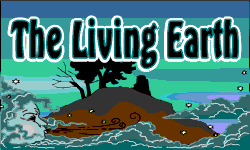The Living Earth
Created | Updated Jul 25, 2010

Droughts, fires, storms, floods, and an asteroid threat : the world last month.
This is my first article for The Post, which is intended to take a look back at the significant natural events on our planet over the last month, and to let you know of any major discoveries in the areas of earth-science.
What a month it has been! The most significant global phenomenon in July was, unquestionably, drought. In many areas of the world, water has become an increasingly scarce commodity. The US announced that every state on continental North America, was affected by water shortages. Similar situations were reported in southern Europe, Canada, Australia, Southern Africa, the Horn of Africa, West Africa, Russia, and northern India. Some of these reports have to be taken very seriously, particularly in Southern Africa and Ethiopia/Eritrea, where the droughts have caused widespread crop failures, and the ominous spectre of famine has begun to rear its ugly head. Some countries in West Africa have adopted novel approaches to ending the dry season. Niger has decided that prayer is the best answer, while Burkina Faso are considering pouring salt into the stratosphere to force precipitation.
The severe drought conditions have brought with them another danger - wildfires. The most prominently reported of these were in the US, where massive fires, usually sparked by unwitting arsonists, ripped through hundreds of hectares of dry forest. The most severe fires occurred in Colorado and Arizona and, at the time of writing this article, firefighters were still struggling with a conflagration threatening some of the massive sequoia trees in California. Wildfires were also reported in Russia and Quebec, where the skies of north-eastern US were made decidedly hazy for a few days.
Ironically, while many parts of the world have not seen any rain in months, some places have been getting far too much of it. Massive typhoons hit Japan, China, the Philippines, and some of the Pacific Archipelagos over the past few weeks, causing severe damage, forcing mass-evacuations and killing many unfortunate people, mainly as a result of landslides.
This month also saw the first storm of the 2002 Atlantic hurricane season. It caused no damage, but many more hurricanes are expected in the coming months. It is believed that, as a result of the El Nino phenomenon, the hurricanes will be less intense than in previous years, but that Pacific typhoons may be more destructive.
Severe rainstorms also caused massive flooding in many places. Most severely hit last month was Bangladesh, where hundreds of thousands were displaced by rising waters. We also had very bad floods in Texas, where our reporter on the spot, Gosho, kept us up to date on the latest developments. Venezuela, China and some parts of Russia were also very badly hit.
From a geological perspective, there were a few moderate earthquakes, the most noticeable being in Iran, where 200 people perished. Also, a report from Iceland reported that a part of the ice cap had collapsed - normally an indication that volcanic activity was occurring just beneath the cap. This can lead to a huge, sudden flood of meltwater, so attention will be focused on developments over the coming months.
There were also some interesting discoveries from the world of science. A frightful looking pterosaur was revealed to the world, while scientists also provided further indications to us all that this planet is hotting up - Alaskan glaciers and Antartic ice fields are melting faster than would be expected, and the Australian Barrier reef is beginning to suffer as a result of warmer waters.
The most sensational discovery was that of an asteroid, NT7, whose orbit comes dangerously close to the earth in 17 years time. Scientist believe that the asteroid will be no threat to the planet, but this did not stop the world's media going into overdrive.
I mentioned El Nino - this periodic phenomenon in the Pacific, associated with a change in the direction of tropical ocean currents, is back, according to scientists. Typically, El Nino causes severe global weather disruption, so the next few months are likely to bring more in the way of flooding, severe storms and droughts. Stay tuned.
Join the Living Earth Society to be kept up to date with the latest developments!
